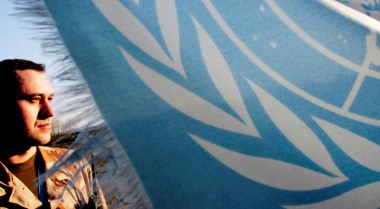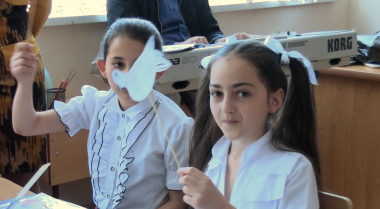
Preventing conflict together in Georgia
The South Caucasus has a long history of ethno-regional conflicts rooted in Soviet times. When the USSR collapsed, several conflicts erupted simultaneously -the Nagorno-Karabakh conflict (1988-1994), the Georgian-Abkhazian conflict (1992-1993) and the Georgian-Ossetian conflict (1989-2008). These conflicts led to tens of thousands of deaths and hundreds of thousands of people were forced to leave their home and seek refuge in neighboring regions or abroad.
Whilst these armed conflicts are now considered frozen, the current situation in the area leaves much room for improvement. Clashes on demarcation lines periodically flare up and human rights violations continue. For example, in June 2019, Georgia witnessed turbulent events due to the alleged growth of Russian influence in the country. This led to many youth-driven protests in the country. The protests preceded a serious deterioration of Georgian-Russian relations and abductions of people in the conflict zone of South Ossetia. Meanwhile, Russian-backed Ossetian authorities intensified the process of “borderisation” and restricted free movement along the administrative border lines.
A Toolbox for Conflict Prevention
Our members in the South Caucasus focus on filling the gaps in preventing violent conflicts and building peaceful societies in this region. They do this through focusing on the implementation of goal #16 of the UN 2030 Agenda for Sustainable Development.
As such, ICCN and our members in Azerbaijan and Armenia (Armenian and Azerbaijani National Committees of Helsinki Citizens Assembly) looked at policies and strategies of the South Caucasian governments through a peacebuilding lens. Together, they identified areas of concern as well as main challenges for conflict prevention.
Monitoring combined with desk-research and the production of policy briefs led to the development of the “Contextualized Conflict Prevention - Regional Monitoring” Toolbox. It drew the attention of governmental bodies to the lack of conflict prevention tools and it provided the necessary guidance on the incorporation of these tools into action plans and strategies.
“This is the first attempt to create a conflict prevention toolbox in Caucasus based on the desk-research and engagement of the Georgian, Azerbaijani and Armenian partners united in the GPPAC regional network as well as prominent pundits from these countries. Thereby, we strive to contribute to the greater and meaningful engagement of civil society actors in the prevention of violent conflict and contribute to the implementation of SDG16 on creating a peaceful and inclusive society.”
Zaal Anjaparidze, ICCN’s coordinator of GPPAC annual Caucasian Dialogue programme.
South Caucasus: Shared Issues, Shared Solutions
Research of GPPAC’s Georgian and Armenian members point to similar problems around conflict prevention in their countries. State agencies are inattentive to early warning signals and their responses are weak. Comprehensive and structured approaches to conflict prevention are still absent. Issues related to the prevention of internal and external conflicts are still not fully reflected in legislation, policies and strategies. The scarcely existing instruments for preventing conflict are not properly used on the ground (e.g. timely exchange of information between the agencies in charge of confidence building and security). Therefore, for conflict prevention to improve, new strategies and concepts must be developed with conflict prevention tools in mind.
Georgia in focus
In Georgia, conflict prevention tools are scattered amongst different agencies of the central government. The latter lacks the conceptual framework of conflict prevention and the term “conflict prevention” is not defined properly in the state’s legislation. The report emphasises the necessity to address this gap.
A Path for Peace in Georgia
This is a precedent: for the first time, research and report developed by a local peacebuilding organisation, ICCN, attracted the attention of the Georgian government. The government officials attended the workshop organised by ICCN and agreed to collaborate. This is an important step forward for peace in the region.

